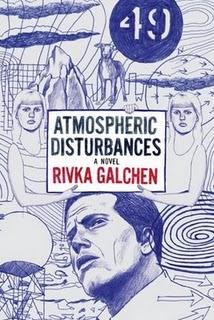Atmospheric Disturbances

In some cases, you may be midway through a story, novel, or film before realizing you’re dealing with an unreliable narrator. He or she is biased, withholding information, or mentally unstable. (Charlotte Perkins Gilman’s disturbing story “The Yellow Wallpaper” springs to mind as just one example.) In Atmospheric Disturbances, the debut novel by Rivka Galchen, it is apparent early on that the main character, psychiatrist Dr. Leo Liebenstein, is off his rocker. Perhaps that’s putting it too strongly. Liebenstein is delusional, but his delusion is at first confined to one specific aspect of his life: he is convinced that his wife Rema has been replaced by a double, who he terms a simulacrum.
As Liebenstein sets out to “find” his wife in a very roundabout manner, we learn how they met at the Hungarian Pastry Shop in Upper Manhattan shortly after Rema arrived in the U.S. from Argentina. We also learn that she is now a translator at the same hospital where Liebenstein works and we are told about one of Liebenstein’s patients, Harvey, who is convinced he is a secret agent of the Royal Academy of Meteorology. The Academy, he believes, is able to manipulate weather and must act against mysterious forces that would use meteorological phenomena for their own purposes.
While treating Harvey, at Rema’s suggestion, Liebenstein decided to play along with Harvey’s version of the world and pretend to be an agent of the Academy as well, a higher-ranking one passing orders along. To make the story convincing, Liebenstein and Rema chose the name of a scientist at the Royal Academy, Tzvi Gal-Chen, who was supposedly issuing Harvey instructions through his therapist. The ruse works and Liebenstein is able to keep Harvey from leaving town without warning by telling him that his assignment is to monitor the New York weather. But now, just hours before the simulacrum appears, he has gone missing. As Liebenstein ponders the meaning of Rema’s doppleganger and how he can find the real Rema, he becomes increasingly obsessed with Tzvi Gal-Chen, believing that his meteorological publications contain instructions that will lead him to Rema. As Liebenstein becomes more and more part of the world Harvey has constructed, the reader must ask, what is the distance between patient and healer? A friend noted that the book calls into question everyone’s perceptions of reality, and in a way that’s true. For example, Rema and her mother have different opinions of what happened to Rema’s father, both plausible, and neither woman seems delusional. Perhaps one of them is in denial, or perhaps they really don’t know. Later, Rema’s overheard telephone conversation reveals her perception of her husband, which differs from her mother’s and probably his own.
Galchen, herself a psychiatrist, writes with an ease and an eye for detail that draw the reader in. While the focus of the story is narrow and there are only a handful of characters, the writing is playful and smart. The reader delights in finding clues as to Liebenstein’s behavior and personality and gaining insight into his character. And while we become frustrated with the errant doctor, his devotion to his wife and her real feelings for him keep us reading.
I found myself exasperated and touched by Liebenstein. His dependence on Rema to ground him is apparent and he describes almost every woman he meets in comparison to Rema. He is also kindhearted in his own strange way, noting that it was wrong of him to leave the simulacrum without a word. His empathy towards her, all while refusing to accept her evidence that she is, in fact, the real Rema, is heartbreaking. Galchen’s prose expresses his longing: “Her voice in the dark, so familiar—is was almost as if Rema was actually there with me, in the absence of luminosity, and maybe she really was there, paying me a visitation.” Seeking Rema has become a kind of holy quest.
Atmospheric Disturbances ends without resolving the questions it raises about Liebenstein’s sanity, Harvey’s strange reappearance, or the existence of Tzvi Gal-Chen. In another novel this might be unsettling, but in this case the beauty of the prose offers the completion that is lacking in the plot. A beautifully written, original debut.